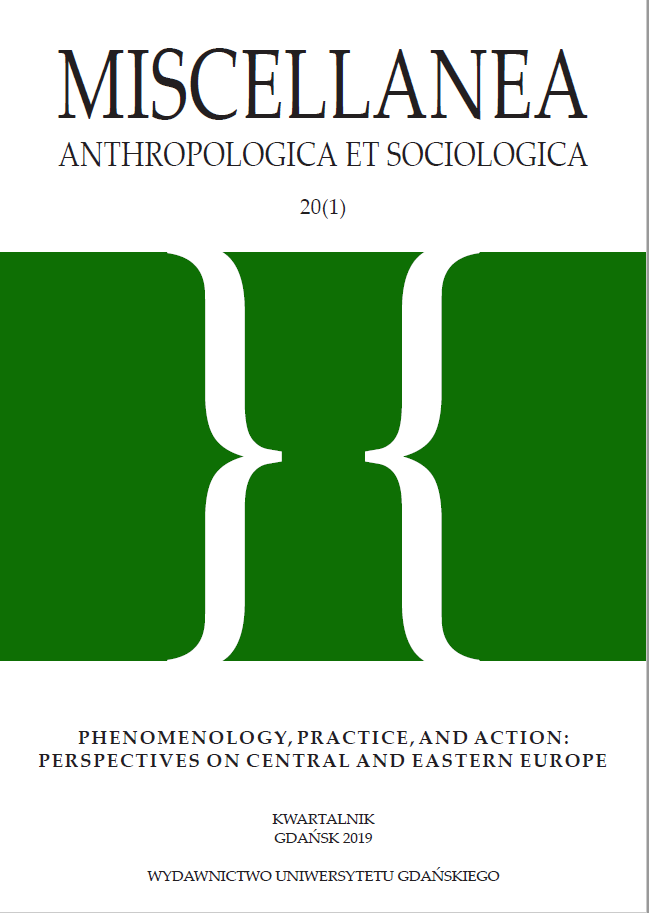On the Absence of Eco-phenomenology in Poland
DOI:
https://doi.org/10.26881/maes.2019.1.10Słowa kluczowe:
eco-phenomenology, environmental ethics, Polish philosophy, Tischner, philosophy of dramaAbstrakt
The paper aims to identify and explain the absence of eco-phenomenological perspective in Polish philosophy. Eco-phenomenology, which emerged as the specialized area of phenomenological movement in the 1980s, explores relations between human beings and nature. The lack of it in Poland, as the paper argues, is not only due to the specific political situation, but primarily because of the great impact of Jozef Tischner’s “philosophy of drama,” which has strongly anthropocentric implications.
Downloads
Bibliografia
Bialer O., 2015, Husserl’s Phenomenological Heritage as a Source Of Innovative Inspiration and Critical Evaluation for Emmanuel Levinas’ Ethics and Martin Buber’s Ecophenomenology, Dialogue and Universalism, vol. 25(3), pp. 127–139.
Calarco M., 2010, Faced by Animals [in:] P. Atterton Pete, M. Calarco (eds.), Radicalizing Levinas, Albany: State University of New Yok Press.
Dzwonkowska D., 2017, Environmental Ethics in Poland, Journal of Agricultural and Environmental Ethics, vol. 30(1), pp. 135–151.
Edelglass W., Hatley J., Diehm C. (eds.), 2012, Facing Nature: Levinas and Environmental Thought, Pittsburgh: Duquesne University Press.
Filek J., 2014, Etyka. Reinterpretacja, Tyniec: Homini.
Fiut I.S., 2005, Jak byłaby możliwa ekofenomenologia? [in:] P. Czarnecki (ed.), Filozofia bliższa życiu: księga pamiątkowa ofiarowana profesorowi Wojciechowi Słomskiemu, vol. 1, Warszawa: WSFiZ.
Grochowska I., 2008, Filozofia dialogu jako jeden z aspektów zrównoważonego rozwoju, Problemy ekorozwoju – Problems of Sustainable Development, vol. 3(1), pp. 67–72.
Ingarden R., 1973, Książeczka o człowieku, Kraków: Wydawnictwo Literackie Kraków.
Jonas H., 1999, Religia gnozy, transl. M. Klimowicz, Kraków: Platan.
Kot D., 2016, Myślenie dramatyczne, Kraków: Copernicus Center Press.
Langer M., Nietzsche, Heidegger, and Merleau-Ponty: Some of their Contributions and Limitations for Environmentalism [in:] Ch. Brown, T. Toadvine (eds.), Eco-phenomenology. Back to the Earth itself, Albany: State University of New Yok Press.
Lovejoy A.O., 2009, Wielki łańcuch bytu. Studium historii pewnej idei, transl. A. Przybysławski, Gdańsk: Słowo/obraz terytoria.
Löwith K., 1971, Zu Heideggers Seinsfrage: Die Nature des Menschen und die Welt der Natur [in:] K. Löwith, Aufsatze und Vorträge, 1930–1970, Stuttgart: Kohlhammer Verlag.
Małecka A., Stark K., 2018, Henryk Skolimowski’s Eco-Philosophy as a Project of Living Philosophy [in:] W. Smith, J. Smith, D. Verducci (eds.), Eco-Phenomenology: Life, Human Life, Post-Human Life in the Harmony of the Cosmos. Analecta Husserliana (The Yearbook of Phenomenological Research), vol. CXXI, Cham: Springer.
Piątek Z., 1998, Etyka środowiskowa. Nowe spojrzenie na miejsce człowieka w przyrodzie, Kraków: Księgarnia Akademicka.
Piątek Z., 2008, Ekofilozofia, Kraków: Wydawnictwo UJ.
Przyłębski A., 1992, M. Heidegger a tzw. ekologia głęboka [in:] B. Andrzejewski (ed.), Ochrona środowiska w refleksji humanistycznej, Poznań: Wydawnictwo PTPN.
Sessions G., 1995, Ecocentrism and the Anthropocentric Detour [in:] G. Sessions (ed.), Deep Ecology for the twenty-first Century, Boston: Shambhala Publications.
Thomson I., 2004, Ontology and Ethics at the Intersection of Phenomenology and Environmental Philosophy, Inquiry, vol. 47(4), pp. 380–412.
Tischner J., 2001, Filozofia dramatu. Wprowadzenie, Kraków: SIW Znak.
Tischner J., 2005, Etyka Solidarności oraz Homo Sovieticus, Kraków: SIW Znak.
Toadvine T., 2003, Introduction [in:] C. Brown, T. Toadvine (eds.), Eco-phenomenology. Back to the Earth itself, Albany: State University of New Yok Press.
Toadvine T., 2016, Phenomenology and Environmental Ethics [in:] S.M. Gardiner & A. Thompson (eds.), Oxford Handbook of Environmental Ethics, Oxford: Oxford University Press.
Tonner P., 2011, Are Animals poor in the World? A Critique of Heidegger’s Anthropocentrism [in:] R. Boddice (ed.), Anthropocentrism. Humans, Animals, Environments, Leiden–Boston: Brill.
Tyburski W., 2006, Powstanie i rozwój filozofii ekologicznej, Problemy ekorozwoju – Problems of Sustainable Development, t. 1(1), pp. 7–15.
Woleński J., Skoczyński J., 2010, Historia filozofii polskiej, Kraków: WAM.
Zimmerman M.E., 1990, Heidegger’s Confrontation with Modernity: Technology, Politics, and Art, Bloomington: Indiana University Press.

 Uniwersyteckie Czasopisma Naukowe
Uniwersyteckie Czasopisma Naukowe




